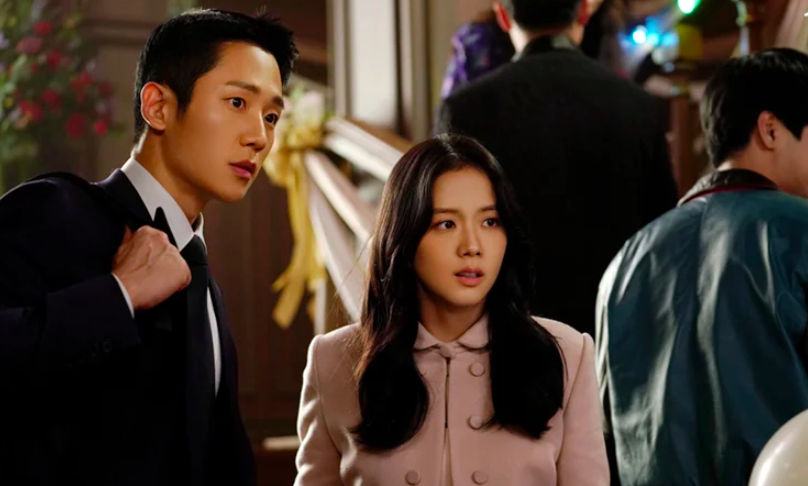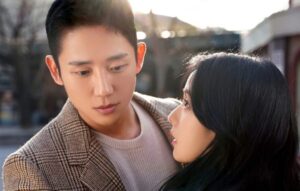
Ever since news of its production first came out, Snowdrop has received major public attention, both good and bad. On the one hand, people looked forward to the drama’s megastar lineup (top-billed by Black Pink’s Jisoo and drama staple Jung Hae-in) and promising direction (it’s helmed by the same brains behind the masterpiece that is SKY Castle). But on the other hand, audiences, particularly Korean audiences, were not pleased with the drama’s seeming distortion and romanticization of a painful past.
Petitions calling for the cancellation of Snowdrop quickly surfaced, with one of them garnering more than 300,000 signatures after the show premiered. Complaints were filed, the court stepped in, and new debates emerged from existing debates, such as whether a cancellation would be akin to censorship, or if critics were just being “snowflakes” about the whole thing. Snowdrop became a hot topic, but the spectacle of the scandal took precedence over its story.
As more episodes rolled in, however, the show’s controversial choices started to gain more context and clarification. Gradually, criticism eased off (if only a little bit) and the clamor surrounding it started to die down. All that’s left to ask now is: is Snowdrop actually any good? Is it, in its own terms, worthy of all the attention it received?
In a word, yes. At least initially. If you can see past its historical blunders and some troubling romantic implications, then it can be an enjoyable drama. Unfortunately, Snowdrop is largely let down by format; the story is too thin and repetitive to stretch into the standard 16-episode arrangement, so it starts losing momentum after a few watches. It seems to have employed the classic K-drama trick of saving every juicy bit till the end for an explosive finale, and the result is a middling and uneven first half filled with filler stories and predictable outcomes.
Much like the scandal surrounding it, Snowdrop started off with a bang. But it was a good bang—epic, ambitious, and evocative. The drama seemed to maximize its big budget by employing grand designs and a sprawling cast of characters. Most impressive are Eun Young-ro (Jisoo) and the ladies of Hosu Women’s University. Everything else in Snowdrop is high stakes and dramatic, so seeing Young-ro and her friends blithely navigate boarding school, whether it’s planning out group dates or covering up for a roommate who didn’t make the curfew, is always a breath of fresh air.
The Victorian-era architecture of the university is also a sight to behold. Though it would be overused in later episodes, it lends a fairy-tale-like feel to the show that nicely emphasizes Young-ro’s innocence. The Western style structure also smartly reflects the globalization that was increasingly affecting South Korea at the time, as do the characters’ particular costuming and wordings, such as Hye-Ryeong’s (Jung Sin-hye) English catchphrase “Anyway.” Later on, the backdrop would also serve as a haunting contrast to the North Korean soldiers’ more austere getups.
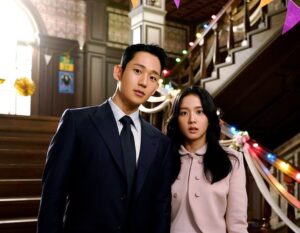
This focus on division is another high point of the show. Aside from the obvious ideological divide between the North and South, there is perhaps an even greater emphasis on internal divides. On the South side, agents Lee Gang-mu (Jang Seung-jo) and Jang Han-na (Jung Eugene) want to focus on their mandate to serve the country, but they’re constantly derailed by a corrupt government that demands their blind loyalty. On the North side, trust in the party line is continually tested as the dissonance between the personal and political grows.
In one thrilling scene, both Gang-mu and Soo-hoo try to come to terms with the fact that beyond titles and allegiances, they are just people trying to survive a cruel ruse. Ultimately, they are just pawns being played by both sides—for power and capital, and nothing more. Desperate for no more lives to be lost, Gang-mu calls Soo-hoo “comrade” and says, “We’re just all rats in a trap. If we fight each other, we’ll die. We must get out alive.”
Then there’s the forbidden romance at the heart of the show. Like most parts of the drama, it begins brilliantly (and Jisoo is convincing as a young girl terribly smitten for the first time) only to simply and sadly falter later on. Young-ro and Soo-hoo’s relationship evolves from Romeo and Juliet to Beauty and the Beast, variously blurring the line between cute and creepy. It’s hard to root for them when one is being held captive by the other. Coupled with Soo-hoo’s unpredictable handling of the hostage Young-ro, their relationship at the moment just seems too violent to resemble anything romantic, much less healthy.
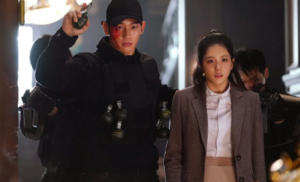
Sadly, it’s not just the love story that loses steam. The drama, in general, becomes more repetitive and predictable as it goes along. By episode five, the main conflict is: who will survive the hostage-taking and what will be the consequences? Incredibly, the show takes five more 40-minute episodes to answer this problem. All the while, the main characters are locked up in the same setting, pondering the same questions, and testing the same ideas over and over again.
What a waste not only of a huge budget but of time as well. They could have used this time to explore backstories or motives in-depth, and while we do get that a bit with Soo-hoo, we’re mostly given protracted scenes and filler stories that distract more than enhance. In particular, the subplot involving the party leaders’ wives is unnecessary and borderline unwatchable. Not only do they do nothing to forward the story, but they are also sad, harmful stereotypes of a housewife: sneaky, vain airheads who will do anything—even kill student hostages—to forward their husbands’ careers.
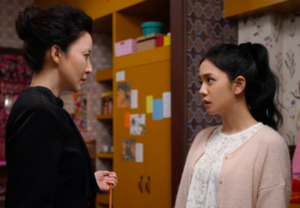
In fact, the female characterizations in Snowdrop are quite confusing. With every Young-ro and Headmaster Pi (Yoon Se-ah), strong-willed and complex women in their own right, there seems to be an Agent Han-na and Doctor Kang Chung-ya (Yoo In-na), outwardly tough girls with problematic roots. Han-na is one of the strongest agents in the show, but it’s revealed that she only joined the force to reunite with her fiance. Even though he routinely ignores her, he is her main and apparently only motivation, and the pair are touted as a love team. Chung-ya, meanwhile, is the highest-ranking North Korean spy in the takeover. But while her male subordinates infiltrated the country through traditional disguises and espionage, Chung-ya is implied to have slept her way to the top. This worrying take on “strong women” is a prevalent problem in K-drama, not just Snowdrop, but that’s a topic for another article.
For now, what we have is a drama that begins beautifully but loses its verve midway. It has become obvious how thin the plot really is, so in typical K-drama fashion, scenes were lengthened and filler stories were increased. Hopefully, the latter half will contain more punches and pick up the pace, but presently, it’s just as well the buzz surrounding the show has died down—as it turns out, there’s less to see as it unfolds.
(Naver. The Korea Herald. FNN News. Korea JoongAng Daily. Yahoo! News. YouTube. Images via JTBC/Disney Plus Korea.)
